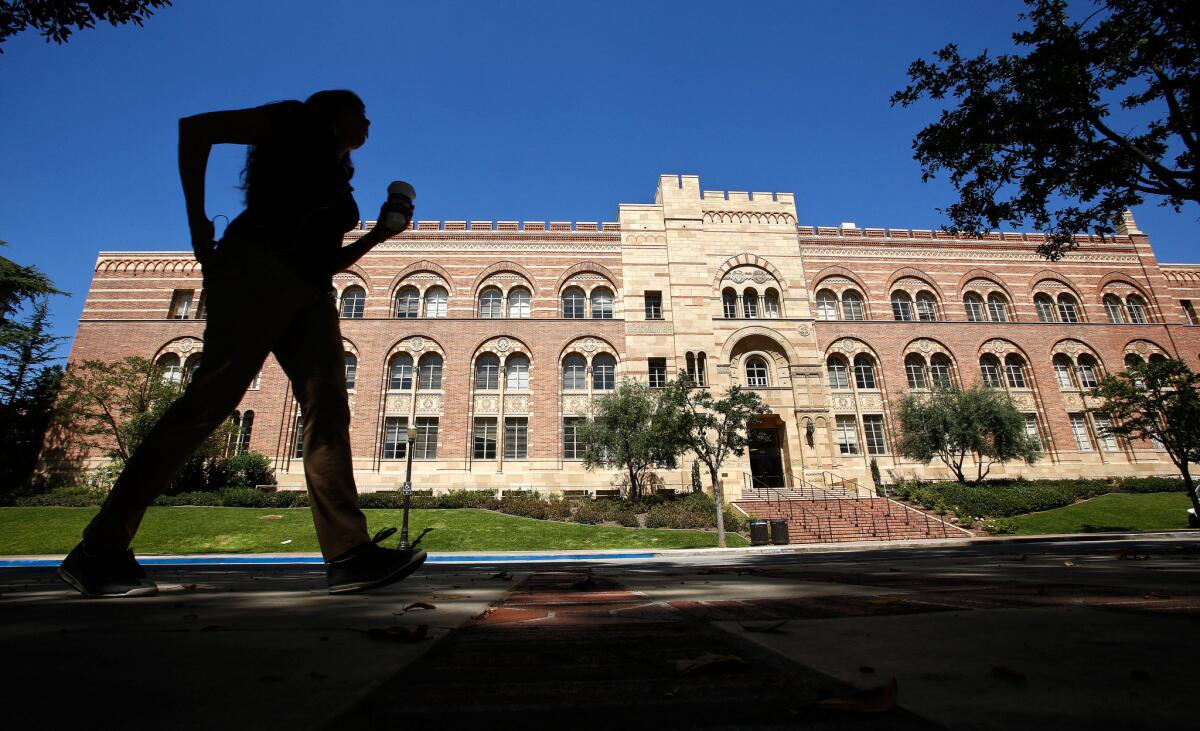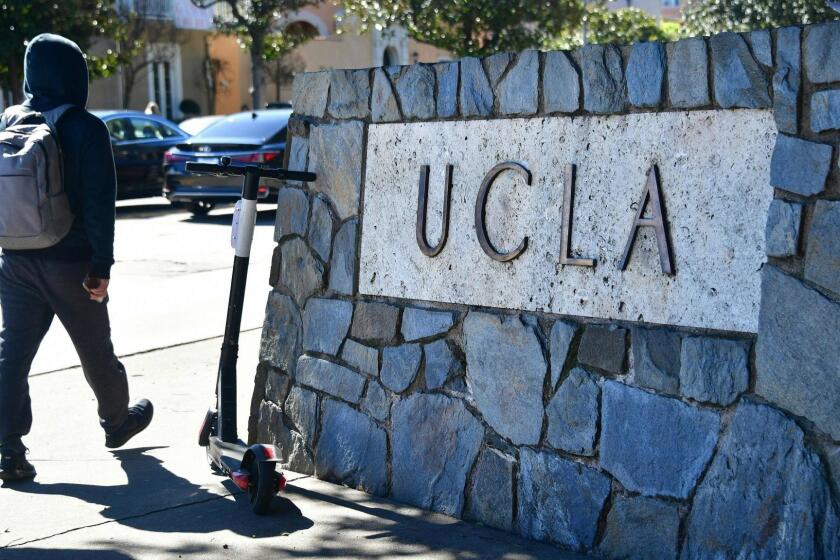Audit finds 22 UC students were ‘inappropriately admitted’ as athletes

Twenty-two of 64 students found to have been “inappropriately admitted” in recent years to four UC campuses by California’s state auditor were brought in as athletes “as favors to donors and friends,” according to information released Tuesday in conjunction with the probe.
The audit was ordered in the aftermath of the Varsity Blues college admissions scandal, in which dozens of parents, coaches and administrators were charged with conspiring to admit students with fake sports resumes to elite colleges.
The actual number of fake athletes accepted by UC Berkeley, UCLA, UC San Diego and UC Santa Barbara
was probably higher, the audit said.
“It is unlikely that the 22 applicants we found represent the true number of applicants whom coaches falsely identified as prospective student athletes to gain the applicant’s admission because of their connections to donors or influential individuals,” the audit said.
The review examined athlete admissions for at least six teams at each school from 2013-14 through 2018-19. It found 13 problematic admissions at UC Berkeley, four at UCLA, four at UC Santa Barbara and one at UC San Diego. According to the audit, the students in question weren’t athletically qualified for their sport, they didn’t “substantially participate” on the team, and factors such as donations to the school or family connections influenced their admission.
The University of California’s failure to rigorously oversee its admissions practices has allowed unqualified students to get in, a state audit finds.
Only admissions with “definitive evidence” that they were inappropriate were included in the total. But other athlete admissions that were reviewed raised concerns too.
“Among that group were several athletes who had questionable circumstances surrounding their admissions whom we did not count in our total of inappropriate admissions,” the audit said. “Some of these athletes had limited or nonexistent athletic qualifications, while others were related to campus staff or a prominent donor. Others were immediately made into a team manager, indicating that the coaches never intended for the applicant to compete on the team.”
The review doesn’t specify which years or teams were impacted but detailed a handful of them. One of the cases involved a UCLA coach facilitating a student’s admission after a fundraising staffer advocated “on behalf of a donor.” The student had previously been rejected in the normal admissions process.
“Although we found the applicant participated in high school in the sport for which they were recruited, we found that they were significantly less qualified than other recruits to the team, and they did not meaningfully participate on the team for UCLA,” the audit said.
The sport and the people involved weren’t identified.
“Last chance to object or push forward. Still think this is a good idea?” the coach said in an email, according to the audit.
“If you feel comfortable, then I think [it’s] good to move ahead,” the fundraising staffer responded.
Like thousands of students each year, the high school senior hoped to secure a coveted spot in the UCLA freshman class.
In a statement, the school said, “It is important to note that all of the athletics-related cases covered in the auditor’s report occurred in the past, before UCLA Athletics adopted a number of additional safeguards, many of which the report itself highlighted.”
An internal UCLA investigation in 2014 found the school admitted a woman as a nonscholarship track and field athlete in exchange for her family pledging $100,000 to the athletic department. She became a team manager. The probe also documented the school rejecting the admission of another woman as a water polo recruit because she never played the sport.
That probe led to reforms at UCLA such as banning donations by families of athletic recruits until they enrolled. Additional safeguards include verifying the qualifications of prospective athletes, checking for donations linked to athletes at the time of admission, and requiring the athlete to spend a minimum amount of time on their team.
The lone UCLA athletic department employee charged in Varsity Blues, former men’s soccer coach Jorge Salcedo, pleaded guilty in July to helping facilitate the admission of two students to the school as soccer players despite them not playing the sport in exchange for $200,000 in bribes.
A Times investigation last year found at least 18 students admitted as athletes were children of UCLA administrators or coaches or had close ties to them. Some were well-regarded in their sports, but others had thin resumes compared with teammates. Those athletes included a gymnast who joined the school’s powerhouse program without a public record of a competitive career.
The audit underscored the motivation to use the athletic admissions process as an end-around to the traditional path into a school. Between 2017-18 and 2019-20, the UCLA committee that reviews athlete admissions green-lighted 98% of applicants for fall admission. The four schools admitted between 14% and 32% of all applicants, the audit said.
“In combination, the high acceptance rate and lower standards in key areas of applicant review elevate the risk of inappropriate influence ... because they make admission as a prospective student athlete an attractive option for applicants who are not academically competitive for admission through the regular admissions process,” the audit said. “Further increasing this risk is the degree to which many teams — including many of the teams that we reviewed — rely on donations as a revenue source.”
More to Read
Go beyond the scoreboard
Get the latest on L.A.'s teams in the daily Sports Report newsletter.
You may occasionally receive promotional content from the Los Angeles Times.












